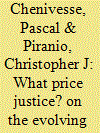|
|
|
Sort Order |
|
|
|
Items / Page
|
|
|
|
|
|
|
| Srl | Item |
| 1 |
ID:
108251


|
|
|
|
|
| Publication |
2011.
|
| Summary/Abstract |
This article explores the possibility of locating an 'ethics of memory' respecting commission of mass atrocities via the link between justice, truth and memory. First, it suggests a typology for memory in relation to justice in its retributive and restorative aspects. Second, it explores how so-called 'memory-justice' arises in the course of international proceedings-and particularly given its significance under the Rome Statute-by considering, critically, the international community's ability to repair or restitute injury by engaging in memory in 'the right way'. Lastly, it suggests limitations of memory-justice of which only some can be overcome. The challenges and arguments for a 'categorical imperative' for memory are left for a subsequent treatment, but arguments in law and practical ethics will be suggested in favour of properly approaching memory in pursuit of justice, with profound consequences for the nascent Court and sister tribunals, in their efforts to break the cycle of conflict in affected regions, and rid the world of the worst crimes known to humanity.
|
|
|
|
|
|
|
|
|
|
|
|
|
|
|
|
| 2 |
ID:
108250


|
|
|
|
|
| Publication |
2011.
|
| Summary/Abstract |
Following the Second World War, evolving notions of human rights have been met by evolving understandings of rights that should be afforded the accused in judicial processes. The following considers this evolution in proceedings stretching from Nuremberg to The Hague, as a struggle between forces that have given birth to each successive stage in international criminal justice, as well as of forces that have grounded rights of defence as advancing the cause of justice itself. Indeed, while notions of 'right to fair trial' and 'equality of arms' suffer from conflicted understandings over what consists in justice, and from conflicting interests over what powers should be afforded parties in the judicial process, this article suggests that the primacy afforded rights of the accused reflects, most evidently in the International Criminal Court, the growing acceptance of liberal democratic notions that justice is most clearly founded not on the treatment of victims, but on the treatment afforded those who mistreat others.
|
|
|
|
|
|
|
|
|
|
|
|
|
|
|
|
|
|
|
|
|